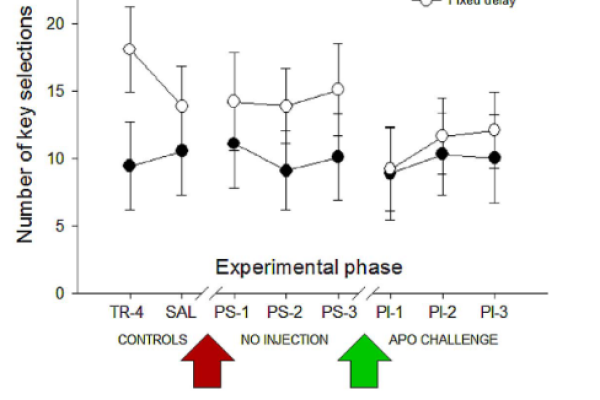2018-01-15

When rodents are given a free choice between a variable option and a constant option, they may prefer variability. This preference is even sometimes increased following repeated administration of a dopamine agonist. The present study was the first to examine preference for variability under the systemic administration of a dopamine agonist, apomorphine (Apo), in birds. Experiment 1 tested the drug-free preference and the propensity to choose of pigeons for a constant over a variable delay. It appeared that they preferred and decided more quickly to peck at the optimal delay option. Experiment 2 assessed the effects of a repeated injection of Apo on delay preference, in comparison with previous control tests within the same individuals. Apo treatment might have decreased the number of pecks at the constant option across the different experimental phases, but failed to induce a preference for the variable option. In Experiment 3, two groups of pigeons (Apo-sensitized and saline) were used in order to avoid inhomogeneity in treatments. They had to choose between a 50% probability option and a 5-s delay option. Conditioned pecking and the propensity to choose were higher in the Apo-sensitized pigeons, but, in each group, the pigeons showed indifference between the two options. This experiment also showed that long-term behavioral sensitization to Apo can occur independently of a conditioning process. These results suggest that Apo sensitization can enhance the attractiveness of conditioned cues, while having no effect on the development of a preference for variable-delay and probabilistic schedules of reinforcement.

When rodents are given a free choice between a variable option and a constant option, they may prefer variability. This preference is even sometimes increased following repeated administration of a dopamine agonist. The present study was the first to examine preference for variability under the systemic administration of a dopamine agonist, apomorphine (Apo), in birds. Experiment 1 tested the drug-free preference and the propensity to choose of pigeons for a constant over a variable delay. It appeared that they preferred and decided more quickly to peck at the optimal delay option. Experiment 2 assessed the effects of a repeated injection of Apo on delay preference, in comparison with previous control tests within the same individuals. Apo treatment might have decreased the number of pecks at the constant option across the different experimental phases, but failed to induce a preference for the variable option. In Experiment 3, two groups of pigeons (Apo-sensitized and saline) were used in order to avoid inhomogeneity in treatments. They had to choose between a 50% probability option and a 5-s delay option. Conditioned pecking and the propensity to choose were higher in the Apo-sensitized pigeons, but, in each group, the pigeons showed indifference between the two options. This experiment also showed that long-term behavioral sensitization to Apo can occur independently of a conditioning process. These results suggest that Apo sensitization can enhance the attractiveness of conditioned cues, while having no effect on the development of a preference for variable-delay and probabilistic schedules of reinforcement.